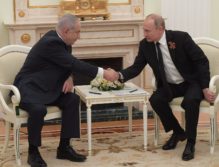
PM Netanyahu & Russian Pres. Putin to meet again over Syria. Illustrative photo, courtesy of Amos Ben-Gershom (Israel GPO)
Two days after a ceasefire was reached between Syrian rebels in the south of the country and Russia on behalf of the Syrian regime, Israeli Prime Minister Benjamin Netanyahu previewed an upcoming visit to Moscow this week in which he will meet with Russian President Vladimir Putin. A key topic in the discussion will of course be Syria.
“At the meeting I will reiterate the two basic principles of Israel’s policy: First, we will not tolerate the establishment of a military presence by Iran and its proxies anywhere in Syria—not close to the border [with Israel] and not far away from it,” said Netanyahu on Sunday in comments released by his office.
“Second, we will demand that Syria, and the Syrian military, strictly uphold the 1974 Separation of Forces Agreement,” he said, referring to the Yom Kippur War ceasefire agreement that established a demilitarized buffer zone between the countries. That second point has been mentioned repeatedly lately, and the latest reference comes after Russia reached a deal with Syrian rebels that will see some of them be allowed to relocate from the Jordanian border region to an area near the border with Israel, according to Al Jazeera. It also comes as fighting near Israel’s border has resulted in more errant fire threatening Israel last week.
On Friday, the same day the ceasefire was reached, the IDF Spokesperson tweeted that a shell landed in that demilitarized buffer zone between Israel and Syria. In response, the IDF fired at the Syrian military post responsible for the shelling.
“The IDF is not involved in the internal fighting in Syria, however, it will continue to implement the 1974 Separation of Forces Agreement that includes maintaining the buffer zone,” said the IDF Spokesperson in a series of Tweets on the incident.
Aside from the errant fire, the fighting in the south of Syria has impacted Israel in another way—refugees along their border. Haaretz reported that the IDF has estimated around 10,000-15,000 Syrians are encamped near Israel.
The Israelis have repeatedly provided tons of humanitarian aid, medical assistance, and admitted Syrians for hospital care, but they have so far decided against opening the border to refugees from a country still technically at war with them.
The thousands of Syrians near the border with Israel are part of a much larger Syrian refugee situation in the country’s south, reported Al Jazeera, citing figures from the United Nations Refugee Agency.
UN High Commissioner for Refugees Filippo Grandi said in a press release on the agency’s website last week that 320,000 Syrians have been displaced by the fighting in the south west of the country. That ultimately impacts Israel and Jordan, and Al Jazeera’s report indicated the Russian-assisted ceasefire will at least enable refugees near Jordan to go home.
That’s not the only effect of the ceasefire. It also allows the Syrian government to retake the critical Syria-Jordan border crossing and it will see Russia take a hands-on role in keeping the peace, as the Russian military police will handle security in the quieted towns instead of the Syrian military.
That level of involvement by Russia underscores their deepening power in Syria and highlights again why Netanyahu needs to regularly communicate with Moscow regarding Israel’s northern neighbor.
On Sunday, Netanyahu noted the importance of his talks not only with their key ally the United States, but also Russia. Said the Israeli leader, “These links with the two great powers are very important to the security of Israel at all times and especially at present.”
(By Joshua Spurlock, www.themideastupdate.com, July 8, 2018)
